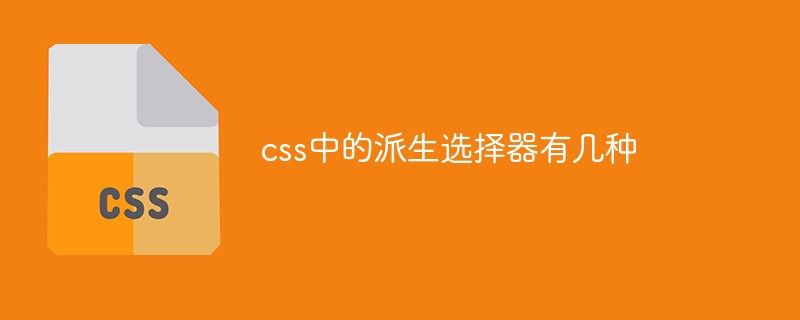There are several derived selectors in css
css中的派生选择器有3种:1、后代选择器,语法“E F{样式代码}”;2、子元素选择器,语法“E > F {样式代码}”;3、相邻兄弟选择器,语法“E + F {样式代码}”。

本教程操作环境:windows7系统、CSS3&&HTML5版、Dell G3电脑。
CSS之派生选择器(上下文选择器)
选择器(selector)是CSS里面非常重要地一部分知识。
根据我暂时浅薄地理解,CSS就是对一份HTML代码里面的元素进行运用各种样式。
所以,第一步就是要准确地定位你想要运用样式的元素。
CSS里面通过各种选择器来定位元素。 CSS里面选择器有很多种,今天就只想说说 “派生选择器”。
一听“派生选择器”这个名字,我真心做不到见名知义地感觉它是什么选择器。一看英文名叫“contextual selectors” ,如果直译就叫“上下文选择器”。虽然名字不文雅,但是我更偏向这个名字。
contexual selector是通过依据元素在其位置的上下文关系来定义样式的。
上下文选择器的情况有三种:后代选择器,子元素选择器,相邻兄弟选择器。
后代选择器(descendant selector)
eg:
HTML代码:
<h1>This is a<em>important</em>heading</h1>
CSS代码:
h1 em {color:red;}语法规则是 h1 和 em 之间有一个空格。那么这一条CSS代码就会运用于包含在
标签内的所有元素。关于后代选择器,很重要的一点是第一个参数和第二个参数之间的代数是可以无限的。
eg:
HTML代码:
<ul> <li> <ul> <li> <em>This will be styled.</em> </li> </ul> </li> <li> <em>This will be styled too.</em> </li> </ul>
CSS代码:
ul em{color:red;}以上css的样式会运用于HTML代码中两处橘色的元素。
子选择器(child selector)
子选择器只会选择某个元素的子元素,而不会扩大到任意的后代元素。
eg:
HTML代码:
<h1>This is <strong>This will be styled.</strong> important.</h1> <h1>This is <em>really <strong>This will not be styled.</strong></em> important.</h1>
CSS代码:
h1 > strong {color:red;}语法规则是h1和strong之间会有一个“>”符号。而这个“>”和前面的h1或者是后面的strong之间的空格都是可有可无的。
在以上的例子中,第一行HTML代码里,元素是的子元素,所有h1 > strong这个选择器会选择到它。
第二行HTML代码里, 不是的子元素,而是
的孙子,所有h1 > strong这个选择器不会选择到它。
相邻兄弟选择器(Adjacent sibling selector)
相邻兄弟选择器会选择某一元素紧随其后的元素,但是前提是他们拥有相同的父级。
eg:
HTML代码:
<h1> <h2>This is a heading<h2> <strong>This will be styled.</strong> <strong>This will not be styled.</strong> <h1>
CSS代码:
h2 + strong {color:red;}语法规则是h2和strong之间有一个“+”,“+”和前面的h1或者后面的strong之间的空格都是可有可无的。
在 以上例子中,第一个strong紧邻着h2并且他们拥有相同的父级(h1),所以h2 + strong会选择到第一个而不会选到第二个.
eg2:
HTML代码:
<p> <ul> <li>List item 1</li> <li>List item 2</li> <li>List item 3</li> </ul> <ol> <li>List item 1</li> <li>List item 2</li> <li>List item 3</li> </ol> </p>
CSS代码:
li + li {color:red;}在以上的例子中li+li是选择紧挨着li后面的第一个
(学习视频分享:css视频教程)
The above is the detailed content of There are several derived selectors in css. For more information, please follow other related articles on the PHP Chinese website!

Hot AI Tools

Undresser.AI Undress
AI-powered app for creating realistic nude photos

AI Clothes Remover
Online AI tool for removing clothes from photos.

Undress AI Tool
Undress images for free

Clothoff.io
AI clothes remover

AI Hentai Generator
Generate AI Hentai for free.

Hot Article

Hot Tools

Notepad++7.3.1
Easy-to-use and free code editor

SublimeText3 Chinese version
Chinese version, very easy to use

Zend Studio 13.0.1
Powerful PHP integrated development environment

Dreamweaver CS6
Visual web development tools

SublimeText3 Mac version
God-level code editing software (SublimeText3)

Hot Topics
 What does placeholder mean in vue
May 07, 2024 am 09:57 AM
What does placeholder mean in vue
May 07, 2024 am 09:57 AM
In Vue.js, the placeholder attribute specifies the placeholder text of the input element, which is displayed when the user has not entered content, provides input tips or examples, and improves form accessibility. Its usage is to set the placeholder attribute on the input element and customize the appearance using CSS. Best practices include being relevant to the input, being short and clear, avoiding default text, and considering accessibility.
 What does span mean in js
May 06, 2024 am 11:42 AM
What does span mean in js
May 06, 2024 am 11:42 AM
The span tag can add styles, attributes, or behaviors to text. It is used to: add styles, such as color and font size. Set attributes such as id, class, etc. Associated behaviors such as clicks, hovers, etc. Mark text for further processing or citation.
 What does rem mean in js
May 06, 2024 am 11:30 AM
What does rem mean in js
May 06, 2024 am 11:30 AM
REM in CSS is a relative unit relative to the font size of the root element (html). It has the following characteristics: relative to the root element font size, not affected by the parent element. When the root element's font size changes, elements using REM will adjust accordingly. Can be used with any CSS property. Advantages of using REM include: Responsiveness: Keep text readable on different devices and screen sizes. Consistency: Make sure font sizes are consistent throughout your website. Scalability: Easily change the global font size by adjusting the root element font size.
 How to introduce images into vue
May 02, 2024 pm 10:48 PM
How to introduce images into vue
May 02, 2024 pm 10:48 PM
There are five ways to introduce images in Vue: through URL, require function, static file, v-bind directive and CSS background image. Dynamic images can be handled in Vue's computed properties or listeners, and bundled tools can be used to optimize image loading. Make sure the path is correct otherwise a loading error will appear.
 What is the function of span tag
Apr 30, 2024 pm 01:54 PM
What is the function of span tag
Apr 30, 2024 pm 01:54 PM
The SPAN tag is an inline HTML tag that is used to highlight text by applying attributes such as style, color, and font size. This includes emphasizing text, grouping text, adding hover effects, and dynamically updating content. It is used by placing <span> and </span> tags around the text you want to emphasize, and is manipulated via CSS styling or JavaScript. The benefits of SPAN tags include semantic clarity, styling flexibility, and ease of maintenance.
 How to wrap prompt in js
May 01, 2024 am 06:24 AM
How to wrap prompt in js
May 01, 2024 am 06:24 AM
When using the prompt() method in JavaScript, you can achieve line breaks through the following three methods: 1. Insert the "\n" character at the position where you want to break the line; 2. Use the line break character in the prompt text; 3. Use CSS's "white" -space: pre" style forces line breaks.
 What language is the browser plug-in written in?
May 08, 2024 pm 09:36 PM
What language is the browser plug-in written in?
May 08, 2024 pm 09:36 PM
Browser plug-ins are usually written in the following languages: Front-end languages: JavaScript, HTML, CSS Back-end languages: C++, Rust, WebAssembly Other languages: Python, Java
 What is node in js
May 07, 2024 pm 09:06 PM
What is node in js
May 07, 2024 pm 09:06 PM
Nodes are entities in the JavaScript DOM that represent HTML elements. They represent a specific element in the page and can be used to access and manipulate that element. Common node types include element nodes, text nodes, comment nodes, and document nodes. Through DOM methods such as getElementById(), you can access nodes and operate on them, including modifying properties, adding/removing child nodes, inserting/replacing nodes, and cloning nodes. Node traversal helps navigate within the DOM structure. Nodes are useful for dynamically creating page content, event handling, animation, and data binding.






